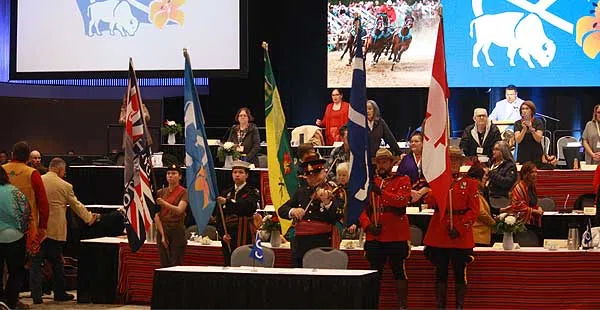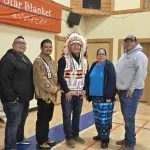
MN-S announced where it plans to invest
With a commitment to strengthen communities and their local chapters, the Métis Nation-Saskatchewan (MN-S) announced a $7 million community investment to support language revitalization, culture programming, and land-based wellness programs, directly to the MN-S locals.
The announcement was made by MN-S Chief Executive Officer Richard Quintal during day two of the 2023 Métis Nation Legislative Assembly (MNLA) and marks historic empowerment for the MN-S locals, said Quintal.
“This is monumental progress that will propel us forward as a community and government,” he said.
During the announcement, Quintal said funding for local programming includes up to $50,000 for opportunities in early learning and childcare, and up to $10,000 will be allocated to support language revitalization programs and language camps in local communities.
“We are changing the way we deliver our programs and services to include direct funding opportunities to our locals,” he said. “It is an investment in our citizens, our community, and our future.”
There will also be funding for social infrastructure to prevent, and reduce homelessness for Métis citizens, as well as funding for land-based learning.
“Education is a key pillar of our nation and will be instrumental in achieving our goals as a government,” said Quintal.
In keeping with supporting community at the grassroots level, the MN-S also provided an update on the work they are doing with implementing Bill C-92.
Bill C-92 is legislation that will ensure Indigenous people will have jurisdiction over their children and family services (CFS).
If an Indigenous community enters into a coordination agreement with Canada and the applicable provinces, the communities’ CFS will have the force of law as federal law and will prevail over conflicting or inconsistent federal, provincial, territorial laws.
More than 20 communities in Canada have requested coordination agreements since Bill C-92 became law. Thus far, five Indigenous communities have entered into agreements with Canada, the first of which was Cowessess First Nation in Saskatchewan.
The MN-S are in the beginning stages of constructing a request to enter into such an agreement with Canada.
“We are at the pre-development of a framework for Bill C-92, the first part of that is consulting with our communities,” said MN-S Vice-President Michelle LeClair.
Kathie Pruden-Nansel, MN-S Minister of Child Family Services said so far, they’ve conducted 27 community consultation sessions across 27 communities.
During the consultation sessions, Pruden-Nansel said they have consistently heard Métis people talk about the loss of culture and language and feeling disconnected from their Métis community.
Many grandparents reported having to care for grandchildren without receiving any financial support.
“We also heard about the grief of children being apprehended from communities, and these communities never seeing them again,” said Pruden-Nansel. “We will never sacrifice our right to look after our own children.”
Typically, the process of entering a coordination agreement takes anywhere from one to five years, and the MN-S is in the first year of that process, said LeClair.
The MN-S is giving notice of intent to the federal government of their desire to enter into an agreement.
MN-S will continue to have community consultations and wants to hear from youth.
“We need to have the youth involved (in the process),” said LeClair. “We need to talk to the people who have lived experience. The youth voice will be integral in this whole process.”

